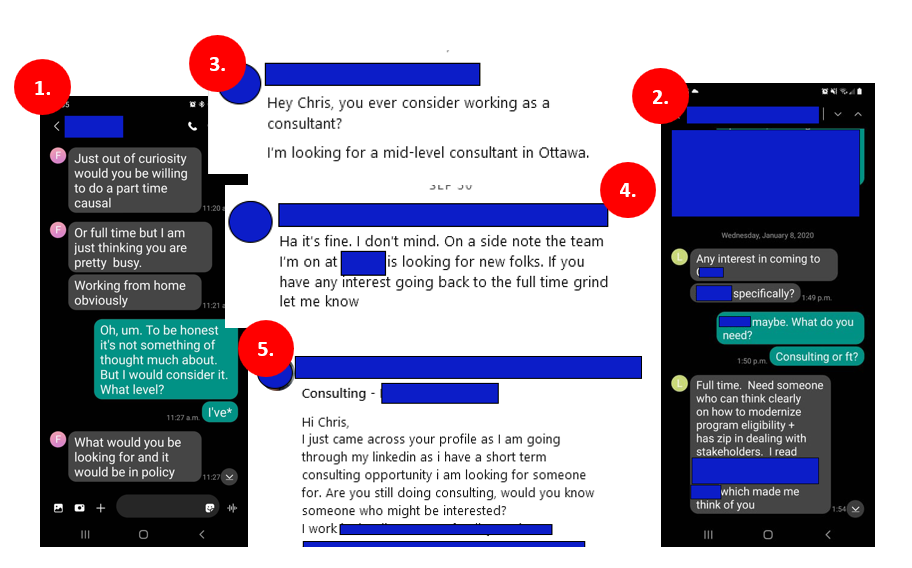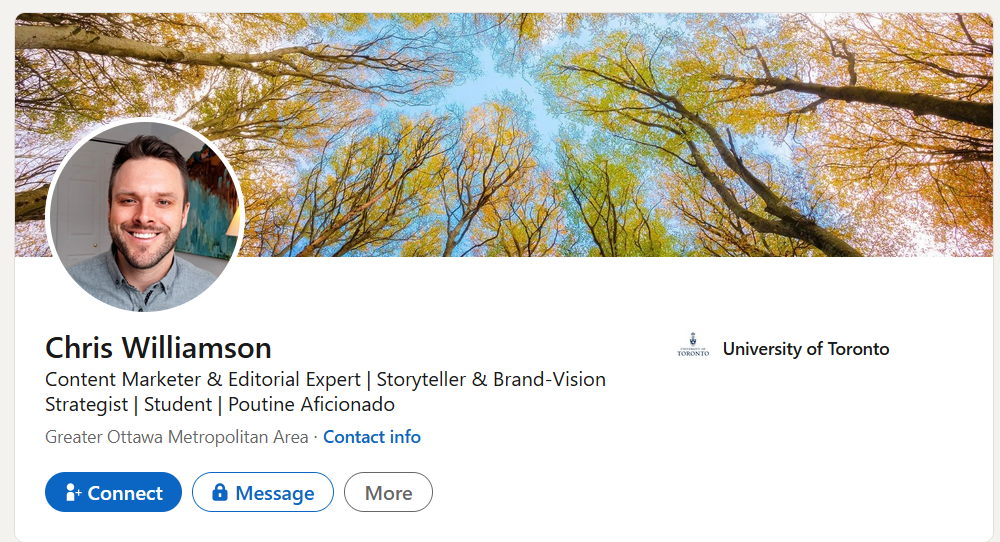Updated February 2, 2023
How can you get a job without a resume?
I was having a conversation this week with someone who’s a fantastic leader in her field. She’s looking for work right now. Halfway through our chat, we had a brief chuckle about finding jobs.
I was telling her about Roostervane, about helping students find jobs. And I said, “Finding a job has changed. It’s not like we’re sending out resumes anymore.”
She laughed, “No way. I never send out resumes.”
That moment solidified something I’d been thinking about since I started Roostervane. It was something I discovered early in my career, especially since I had exposure to a lot of industry leaders while I worked at a think tank.
I realized that many of the people with the best careers NEVER send out a resume. The first time I was hired, it was a personal contact I made (a cold email) first, and a resume second. In the past year, I’ve been offered jobs via LinkedIn, email, and even text messages, without ever applying.
And when leaders I know are looking for a new job or their next opportunity, they also don’t usually send out resumes. They activate their network. They let people know they’re looking. They ask around.
In short, people are getting great job offers COMING TO THEM, and are building great careers without resumes.
And you can do it too. You don’t have to be a senior executive. You just need to have these things.
article continues below the video…
Can you get a job without a resume?
Oh God yes. I’ve gotten most of my jobs without a resume. Employers are looking for someone to solve a problem for them. Sometimes they use a resume to judge that person. But often they don’t. Here are some of the job offers I’ve gotten over the years, either as text messages or on LinkedIn. And a few of them pay around $100k!

7 Ways to get a job without a resume
1. A stellar brand
People should get a feeling from you. That’s what a brand is after all. It’s the way people feel about you.
And in the world of work, a personal brand means that people MUST feel that you’re a professional who’s got stuff to offer, and they should also feel that you’re someone they’d like to work with.
And there’s one place that matters more than any other for cultivating your brand.
LinkedIn.
You don’t have to be a LinkedIn influencer, and you don’t have to have a million followers. But your LinkedIn should be clean with a great picture and smooth copy. When you talk to people, they should see you as intelligent, presentable. Your headline should say clearly what you do and the value you bring (more on this below).
This is a dummy profile I made to give you an idea.

Having a brand on LinkedIn means that you need to get visible. Nobody will find you if you’re not. And a great way to do this is to share posts weekly, things you’re thinking about, stories, workplace observations, job tips, articles you like, anything that’s going to help you show up in people’s timelines.
Now I can hear some of you saying, “Chris, that’s a lot of hard work.”
Guess what. So is sending out thousands of resumes and getting no response. If you want employers to come to you, you’ve got to be seen.
You can also try LinkedIn Premium, which gives you more info about your profile.
I wrote an article about whether LinkedIn Premium is worth it.
2. A filled-out LinkedIn
Okay, sticking with LinkedIn here. A lot of people who get a job without a resume get it based on their Linkedin. If you have high income skills that are in high demand, you might find people coming to you.
Recruiters search for certain things on LinkedIn all the time: some of my friends who are data scientists or product managers get hit up a lot.
Now, not all of us will get that. I never had recruiters slipping into my DMs when I started my career. So don’t fuss if you don’t. But at least fill out your profile! What have you got to lose?
If you don’t have “in-demand” skills yet on your LinkedIn, you can use platforms like Skillshare and Datacamp to learn them!
(This is the course I took to start learning my in-demand skill, SEO!)
3. A portfolio
Who gets hired without a resume most? My guess would be people who create stuff. I’ve hired designers and coders without ever reading their resume. I don’t care. I just want to know what they can do FOR ME.
And the best way for someone to show me what they can do is with a demonstration. For example, I might want to see a portfolio of stuff you’ve done. When I hired a web designer, I looked at other websites they built. Duh.
I get hired to do SEO consulting now without a resume. I just send the numbers from this site and others, showing how I’ve grown them. I doubt anyone cares that I used to manage projects for a think tank. They care if I can get their site to the top of Google.
Here are some people who DEFNITELY can get hired without a resume:
- Copywriters
- Content writers
- SEO specialists
- Web designers
- App designers
- Graphic designers
- Illustrators
- Video editors
If you need a portfolio, you can easily build a website with something like Squarespace and show off your stuff. And if you’re trying to start a blog to show your writing chops, I’d recommend Bluehost instead — it’s a better place to build a content-heavy site. It’s where I started Roostervane.
4. An ever-growing network
Everyone needs to network. By “networking,” I mean building relationships with people in the world of work, who will benefit your career.
I’ve spent a lot of time talking about networking, and I still get push-back. So let me be clear.
Unless you have a ridiculously in-demand skill set, there’s no way jobs will come to you without networking. All the personal branding in the world is unlikely to crack that code. (Really, personal branding is what gets you more networking conversations.)
So, if you’re not willing to network, go back to throwing resumes on a pile.
The good news? Networking doesn’t suck. In my experience, it’s just a conversation. It’s not scary, it can be casual, but it should be intentional.
Yet 85% of positions are filled through networking. 85%!!!
Let that sink in.
If you’re not networking, your career is suffering. And if you’re scared, let me just put your mind at ease. Imagine having a cup of coffee with someone and finding out about their work. That’s networking.
I did this video on building your network a while back.
5. Informational Interviews
These are related to networking, but a lot of job offers I’ve had came through informational interviews. An informational interview ISN’T trying to hit someone up for a job offer. In fact, an informational interview IS just having coffee with someone and asking them about their work.
You can ask questions like:
- What is your job like?
- What do you like about your job?
- What do you dislike about it?
- How did you get into your position?
- What advice would you have for someone in my shoes?
Just to be clear, I’ve NEVER asked for a job during an informational interview. They’re fact-finding missions. But inevitably, I’ve had people email me after to offer jobs.
The thing is, many employers hate hiring, put it off, and are looking for someone they know. When you get on people’s radar, you’re often entering the circle of “people they know, like, and trust.” And that can lead to offers.
6. A clear value proposition
When companies build products or services, they think through the value proposition. The value proposition is simply, why you or your product? Why is it better than the competition?
A personal value proposition is the same. It’s the proposition that tells people why you’re the best one for the job.
This could go in a resume, but since we’re not talking about resumes here, let’s talk about your LinkedIn Headline and About section—writing these two things with a value proposition is one of the best ways to get noticed on LinkedIn. (If you want to get a job without a resume, you’ll need LinkedIn.)
You need to write a value proposition that connects to the real world. So, if I were an English major (which I was in my undergrad), maybe I’d write something like this:
Sample LinkedIn Summary for an English Grad (with clear value proposition)
Headline Title: Content Creator | Award-Winning Writer | Storyteller
I was one of those nerds who loved Shakespeare in high school (don’t judge me!). I realized the power of the written word to bring you to another world or to make you cry about the tragic death of someone who never existed. And that’s why I became obsessed with writing AMAZING content, using the power of words to make people feel things. I’ll help your company tell your story in a way that connects to your customers and increases conversion.
I’ve written 3 guest columns in the local paper AND I’ve been published in 1975 Magazine and Lorbes. My blog on great storytelling gets thousands of hits a month (only a few of which are my mom), and my SEO reach increases 20% monthly. I’m HubSpot certified in Content Marketing, Digital Marketing, and SEO, and totally comfortable with WordPress, SEMRush, Google Analytics, and Adobe Photoshop.
I’ve taken the liberty of adding a few publications, but if you’re an English grad you can literally pitch blogs, websites, and magazines this week and get something published and on your record — it would also be helpful if you wanted to be a freelance writer.
All of these are things you can do and/or learn quickly, and you’ll have a really clear value proposition.
This is an English grad who will get a job without a resume.
And once you create a value proposition like this, use it to tell your story! When you network, share this WHY and connect it to the work you want to do. (ie. I’m looking for a place that I can help a company share their stories in a way that people actually want to hear.)
Conclusion
That’s it. These are the three main things most people don’t do, or else don’t do well. If you can do these things and do them consistently, jobs and opportunities will come to you!
So stop sending out resumes, especially if you have a bit of time before you need your next job. Or, keep sending them out, but also do these things. And watch your job search transform.



